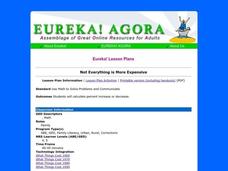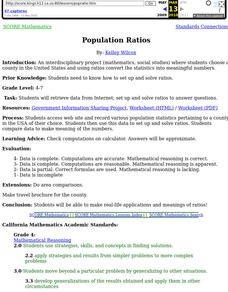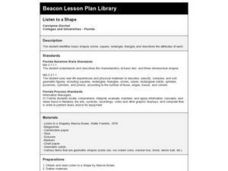Curated OER
What's Below Zero?
Students examine the concept of positive and negative integers, adding and subtracting integers on a number line. They visit various Internet websites, solving problems using integers and completing a worksheet.
Curated OER
Map Studies - Estimate And Measure Distance
First graders explore estimating and measuring distances. They analyze and discuss a map of New York State, make estimations, measure distances using yarn, and calculate total distances between cities on the map.
Curated OER
Angle Attributes and Measures
Seventh graders explore the concept of angles. In this angles lesson, 7th graders use protractors to measure angles. Students sing an angle song. Students discuss attributes of angles using a two-color plate manipulative.
Curated OER
Measurement, Perimeter and Area
Students explore the concept of measurement. In this measurement lesson, students collect data about themselves such as height, finger length, neck circumference, foot length, and other body measurements. Students cut squares...
Curated OER
M&M Exponential Activity
Young scholars create a scatter plot of their experimental data. In this algebra lesson, students use M&M's to determine an algebraic model. They discuss results in class.
Curated OER
"it's All in the Cellar"
Seventh graders examine the process of constructing a site plan map at archaeological sites. They discuss the process of mapping techniques and calculation of percentages, create a plan site map of a cellar at Jamestown, and calculate...
Curated OER
Making a Brain: Aritifical Neural Network
Students explore how the brain works. For this nervous system lesson, students create a network of "neurons" to simulate how the nervous system and the brain work together.
Curated OER
At Home on the French Frontier: 1700-1800
Students role play bartering for goods and services as the French settlers did in colonial Illinois. They start with eight household items to acquire through bartering. They have to calculate values for each object and determine the...
Curated OER
"Is a Blue Whale the Biggest Thing There Is?" by Robert Wells
Students discuss how big is big. They compare the area and perimeter of an acre and a football field.
Curated OER
Bar Me In
Fourth graders watch a video about constructing bar graphs. They create their own graph and interpret it.
Curated OER
A Day at the Beach
Student read Sheryl Wilson's story, "A Day at the Beach" while classifying items they find. They design a chart of the items before using educational graphing software to create a graph.
Curated OER
Not Everything Is More Expensive
High schoolers investigate the concept of using different types of presentations to help solve mathematical problems. They research the use of illustrations to help understand data and its interpretation in a graphing format. Students...
Curated OER
Population Ratios
Students access web site and record various population statistics pertaining to a county in the USA of their choice. They use this data to set up and solve ratios. They compare data to make meaning of the numbers.
Curated OER
Listen to a Shape
First graders identify basic shapes (circle, square, rectangle, triangle) and describes the attributes of each. They use magazines to find examples of each shape, and then make a collage.
Curated OER
The Demise of Copper's Trading Power
Eighth graders evaluate statistical equations. They examine data from archaeologists at Jamestown, complete statistical equations using the sets of data, and graph the results.
Curated OER
Credit Purchases
Twelfth graders calculate interest on purchases bought with a credit card. They use the formula I=PRT to find the interest. In pairs, they use a flyer to calculate the interest for electronic items.
Curated OER
Sliding Along
Third graders use a ruler that has a bag tie slider attached to it to measure a number of items. While measuring, they complete a "Sliding Along" worksheet and a "Sliding Synthesis Journal." In the journal entry, they include what they...
Curated OER
Wheeling Around
Eighth graders explore the characteristics of a circle and the formulas to find circumference. They use a bicycle wheel to determine the circumference around a wheel. They utilize a worksheet imbedded in this plan which has a variety of...
Curated OER
Money Lessons That Cash In
Every child is fascinated by money. Teachers can use money lessons that expand on this inherent interest.
Curated OER
A Penny for Your Thoughts
Students collect pennies to donate to Kiwanis International for their international effort to buy salt for children's bone development. They calculate the amount of money donated, calculate how many children will receive salt, and write...
Curated OER
The Dot and Dashy Language
Students examine and discuss the Morse Code. In small groups they develop messages using Morse code and take turns decipering the messages.
Curated OER
Careers
Learners discuss job choices, careers, and how they can affect lifestyles. They research a job they are interested in and write answers to questions about that job. They prepare a poster which includes information about the career they...
Curated OER
Dressing in Early American Times
Fifth graders, by doing research and seeing actual and simulated artifacts, gain knowledge of and make comparisons about clothing in the Colonial and early Republican eras with attire of present time.























